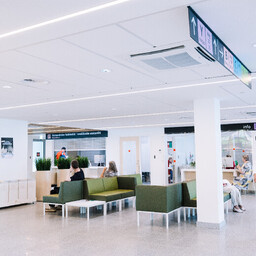Meditsiiniasutustes tekivad üha rohkem keeleprobleeme
.
Paljud ei oska eesti keelt
.
Nooremad arstid oskavad inglise keelt
, vanemad vene keelt.
See teeb suhtlemise raskeks
.
Meditsiiniasutustes tekivad üha rohkem keeleprobleeme
Tõlge fraasile: Meditsiiniasutustes tekivad üha rohkem keeleprobleeme
EN
Language problems are increasingly arising in medical institutions
Paljud ei oska eesti keelt
Tõlge fraasile: Paljud ei oska eesti keelt
EN
Many do not know Estonian
Nooremad arstid oskavad inglise keelt
Tõlge fraasile: Nooremad arstid oskavad inglise keelt
EN
Younger doctors know English
See teeb suhtlemise raskeks
Tõlge fraasile: See teeb suhtlemise raskeks
EN
This makes communication difficult
Põhja-Eesti regionaalhaiglas on see probleem kah suur. Haigla juht Marit Märk ütleb, et probleem on kasvanud sisserändajate ja Ukraina põgenikega.
Maailmas on keeleprobleemid meditsiinis tavaline. Arstid ja patsiendid räägivad erinevat keelt. See vajab lahendust. Eestis on riigikeel eesti keel. Kuid mõnel arstil ja õel on võimalik rääkida ka muus keeles.
Keele teadmisega ei piisa
.
Meditsiiniline abi peab olema hea ja täpne
. Nooremarstide ühenduse liige Johanna Rõigas ütleb, et keelebarjääri lahendamine ei saa olla ainult arstide töö.
Keele teadmisega ei piisa
Tõlge fraasile: Keele teadmisega ei piisa
EN
Knowing the language is not enough
Meditsiiniline abi peab olema hea ja täpne
Tõlge fraasile: Meditsiiniline abi peab olema hea ja täpne
EN
Medical assistance must be good and accurate
Haiglates pole piisavalt tõlkeid
.
Patsientidel on soovitatav kaasa võtta keelt oskav saatja
. Arstidel ei ole kohustust patsientide keelt osata. Samuti ei pea patsiendid eesti keelt oskama.
On vaja vahendajaid
.
Haiglates pole piisavalt tõlkeid
Tõlge fraasile: Haiglates pole piisavalt tõlkeid
EN
There are not enough translators in hospitals
Patsientidel on soovitatav kaasa võtta keelt oskav saatja
Tõlge fraasile: Patsientidel on soovitatav kaasa võtta keelt oskav saatja
EN
Patients are advised to bring a companion who knows the language
On vaja vahendajaid
Tõlge fraasile: On vaja vahendajaid
EN
Mediators are needed
Mõnedes riikides on meditsiiniasutustes tõlkide võrgustik
. Samuti on võimalik kasutada digilahendusi. Praegu kasutatakse tõlkerakendusi, kuid need ei ole alati täpsed.
Vaja oleks meditsiinile spetsiaalseid lahendusi
.
Mõnedes riikides on meditsiiniasutustes tõlkide võrgustik
Tõlge fraasile: Mõnedes riikides on meditsiiniasutustes tõlkide võrgustik
EN
In some countries, there is a network of translators in medical institutions
Vaja oleks meditsiinile spetsiaalseid lahendusi
Tõlge fraasile: Vaja oleks meditsiinile spetsiaalseid lahendusi
EN
Special solutions for medicine are needed
Eestis on palju võõrkeelset teavet. Näiteks kuuleb kaubanduskeskustes vene keelt. See võib vähendada eesti keele õpimotivatsiooni.
Võõrkeelne teave on õigustatud, kui see puudutab tervist või julgeolekut
.
Võõrkeelne teave on õigustatud, kui see puudutab tervist või julgeolekut
Tõlge fraasile: Võõrkeelne teave on õigustatud, kui see puudutab tervist või julgeolekut
EN
Foreign language information is justified when it concerns health or safety
More and more language problems are arising in medical institutions. Many do not know Estonian. Younger doctors know English, older ones know Russian. This makes communication difficult.
This problem is also significant at the North Estonia Regional Hospital. The hospital's director, Marit Märk, says the problem has grown with immigrants and Ukrainian refugees.
Language problems in medicine are common worldwide. Doctors and patients speak different languages. This needs a solution. In Estonia, the official language is Estonian. However, some doctors and nurses can also speak another language.
Knowing the language is not enough. Medical assistance must be good and precise. Johanna Rõigas, a member of the Young Doctors' Association, says that solving the language barrier cannot be the sole responsibility of doctors.
There are not enough translators in hospitals. Patients are advised to bring someone who knows the language. Doctors are not obligated to know the patients' language. Similarly, patients do not have to know Estonian. Mediators are needed.
In some countries, there is a network of translators in medical institutions. It is also possible to use digital solutions. Currently, translation applications are used, but they are not always accurate. Specialized solutions for medicine are needed.
There is a lot of foreign language information in Estonia. For example, Russian is heard in shopping centers. This may reduce the motivation to learn Estonian. Foreign language information is justified when it concerns health or safety.

